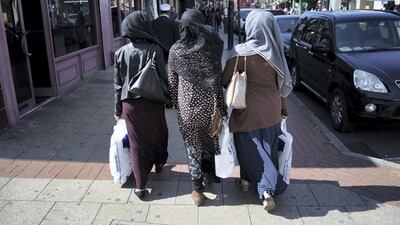With a purchasing power of around £30 billion every year, British Muslims represent a huge consumer market — but it is one that many mainstream retailers are still failing to tap into.
On Edgware Road, London's so-called "Little Arabia", the pavements are bustling with customers keen to purchase clothes, fabric, jewellery and snacks in time for Eid Al Adha.
The many local independent and family-owned stores are well-prepared for a surge in business at this time of year, while the Lebanese restaurants and shisha bars are even livelier than usual. Most outlets are open late, some round the clock.
However, a short walk away in Oxford Street, Britain's best-known shopping thoroughfare,it is a very different picture, with few visible signs that the UK's largest retailers are making any effort to market Eid.
While supermarket chains such as Tesco and Argos rolled out a range of special spreads in the lead-up to Ramadan and Eid Al Fitr, the first of the two annual Eids, earlier this year, there is much less promotion this time around.
Businesses should not ignore the power of the Muslim pound. According to a 2014 report by the Muslim Council of Britain, the Muslim market is worth £20.5 billion a year to retailers in the UK.
Mohammed Shafiq, chief executive of the Ramadhan Foundation, believes that amount is much higher. "It certainly would have gone up to at least £30 billion," he told The National. "There is a huge potential there for investors. That is the really important thing to remember. You're not doing the Muslim community a favour by having dedicated clothes lines and so on. You're helping your business grow."
Mr Shafiq said British retailers have woken up to the opportunity in recent years, but that there is a lot more that could be done.
"About 10 years ago, nobody did anything. Five or six years ago, we started seeing some of the supermarkets in Muslim and Asian areas lay out a small selection of Ramadan-related and Eid-related goods and materials. But that's about it. That's all that happens."
The level of marketing is clearly far less than for other festivals, such as Christmas, Easter and Halloween, which are major events in the British retail calendar.
“The retail market spends billions on Halloween, Bonfire Night and special occasions like that. What’s wrong with spending some money on Ramadan, Eid, and Hindu and Jewish festivals as well?,” Mr Shafiq asked.
One British firm that is actively courting the Muslim pound is Hotel Chocolat. The upmarket confectionery chain advertised a range of Eid products on its website, including hampers containing alcohol- and gelatin-free chocolates. Many Muslims avoid eating gelatin as it can contain processed pork.
“We have really showcased it in the shops,” chief executive Angus Thirlwell said. Muslim customers “loved how we are participating in this event,” he added.
The National contacted retail chains House of Fraser and Asda to ask about their plans to market the Eid holiday, but did not receive a response. According to Mr Shafiq, H&M is the only retailer which puts up any sort of festive Muslim posters, usually at the end of Ramadan. He believes anti-Muslim sentiment is a major reason for why top leading British brands shy away from promoting Islamic festivals.
“There is a real fear among retailers that because of the rampant Islamophobia in our society, their brand will be damaged if they somehow support Muslims to come and shop there. I think that definitely plays a big part.”
He pointed out that when supermarkets started rolling out halal food several years ago, it provoked an outcry from sections of the British public, particularly on the far-right but also in some of the mainstream media.
“There was a fear that ‘Muslims are taking over our supermarkets’,” he said. “Even then, that sort of mentality has not gone away.”
Najah Jawed, who works at Nawras chocolate and dates shop on Edgware Road, believes that mainstream retailers are missing an opportunity.
“We do some extra merchandising and marketing around Eid, mostly we advertise online and that works well with our customers,” she said.“Larger shops that you’d find on the high street don’t really seem to do anything for Eid… maybe they are missing out on part of the market, but Eid is a good time of year for our sales.”
London-based fashion brand Aab, which sells a range of modest clothing online and in various department store chains, also looks forward to this time of the year. The brand puts out a special Eid collection every year, a month before the actual festival.
"We definitely see a spike in sales during Ramadan and Eid, and then the second Eid as well," Altaf Alim, commercial director at Aab, told The National.
Mr Alim believes mainstream department stores such as Debenhams, which sells Aab’s products, do increasingly recognise the value of the Muslim pound, but more could be done.
“The market as a whole is starting to recognise the value of the Muslim pound. There is definitely awareness and an impetus now for many mainstream brands and retailers to tap into this market.
“A lot of stores do promote the first Eid, but less so the second one. They are missing a trick there — perhaps it’s a case of more education needed so that they understand the different festivals.”
The argument is even more compelling given that the British high street is facing tough times with economic uncertainty and rising inflation prompting households to rein in spending.
“Retailers should be grabbing an opportunity like this with both hands — particularly in a difficult market like this,” Mr Shariq said. “There is a phenomenal opportunity for people who want to make money. The Muslim pound is a huge resource, and incredibly lucrative if you get it right.”

